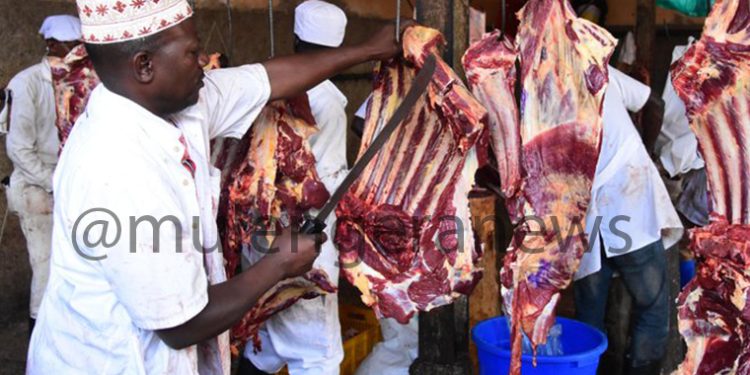By Mulengera Reporters
The Parliamentary Committee on Health has unveiled a damning report on the deplorable state of abattoirs and slaughterhouses across Uganda, raising serious concerns about public health risks posed by these facilities.
The report, presented by Committee Chairperson Dr. Asaba Ruyonga, revealed widespread unsanitary conditions in most of the inspected facilities, where animals are slaughtered without adequate hygiene standards.
Following heated debate, Deputy Speaker Thomas Tayebwa directed the Executive to implement the recommendations adopted by Parliament through a coordinated inter-ministerial effort. State Minister for Local Government Victoria Rusoke pledged to spearhead the initiative, collaborating with the Ministries of Agriculture, Health, and Water and Environment, and promised to report back within a month.
Key Findings:
The report highlighted that out of the 19 abattoirs inspected; only 12 had designated structures for animal slaughter. However, the poor hygiene standards in these facilities undermine the safety of meat produced for public consumption.
Water Supply and Sanitation
The availability of clean waters—a critical necessity for maintaining hygiene—was found lacking in most facilities. Only 31% of the abattoirs had running water connected to the National Water and Sewerage Corporation (NWSC). Many relied on water harvested from tanks, boreholes, or ferried in jerry cans. Frequent disconnections due to unpaid water bills exacerbated the issue in places like Jinja City abattoir.
Sanitary facilities were similarly appalling. Only 47% of the abattoirs had ventilated improved pit latrines, and even those were housed in dilapidated structures with no separation for male and female users. Some facilities, such as Hoima City abattoir, lacked any latrines, while others, like Kalerwe abattoir, shared facilities with local market vendors.
Waste Management Failures
The committee identified widespread mismanagement of animal waste, posing severe pollution risks to surrounding communities. Only 16% of the facilities had functional drainage systems, and many, like Masaka City and Kalerwe abattoirs, had outdated or stagnant drainage systems that emitted foul odors and caused environmental hazards.
The absence of incinerators for disposing of condemned carcasses and animal organs was another critical shortfall. Only a few facilities, including those in Iganga and Kampala Capital City Authority, had proper incinerators in place. The committee urged the National Environmental Management Authority (NEMA) to develop waste management standards for slaughterhouses and enforce their implementation.
Recommendations and Legislative Action
The committee’s report proposed several measures to address the dire situation:
- Investment in Waste Management: Slaughterhouse operators should install functional incinerators and drainage systems.
- Licensing and Regulation: Local governments must ensure abattoirs operate under valid licenses and adhere to standard hygiene practices.
- Improved Monitoring: The Ministry of Agriculture should enforce veterinary inspection standards, prevent the forgery of inspection stamps, and improve the transportation of animals and meat.
- Construction of Pig-Specific Abattoirs: With pork demand on the rise, local governments should construct dedicated facilities to ensure clean pork production.
The report also called for value addition to by-products like hides and skins and urged NEMA to conduct environmental impact assessments before approving new abattoirs.
Debate in Parliament
Kiboga District Woman MP Christine Kaaya Nakimwero, who initially raised the issue, agreed with the findings. She emphasized the need to separate animal markets from abattoirs to curb livestock theft and illegal slaughter. “Someone can sell a stolen animal and immediately slaughter it to destroy evidence,” Nakimwero remarked.
Other MPs echoed concerns over poor inspection practices and demanded stricter government oversight to ensure that meat reaching consumers is safe for human consumption.
The report’s findings have shed light on the urgent need for systemic reforms in Uganda’s abattoirs to safeguard public health. As Parliament awaits the Executive’s response, it remains to be seen whether the government will take swift action to address the dire state of the country’s slaughterhouses. (For comments on this story, get back to us on 0705579994 [WhatsApp line], 0779411734 & 041 4674611 or email us at mulengeranews@gmail.com).
































